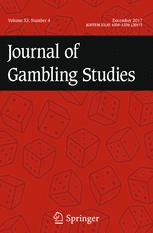 Título: Gambling behavior of adolescent gamblers
Título: Gambling behavior of adolescent gamblers
Autores: Richard Govoni M.A., Nicholas Rupcich CGC, G. Ron Frisch Ph.D.
Data: 1996
Abstract
An adolescent version of the South Oaks Gambling Screen was administered to 965 high school students, aged 14 to 19 years, in the city of Windsor, Ontario. Ninety percent of the adolescents were involved in gambling activities and a substantial proportion of these were engaged in underage gambling. High levels of problem gambling behaviors were found. Problem gambling behaviors were found to be related to the number of different gambling activities and the amount of money gambled. Problem gambling was defined as a score of five or more on the SOGS-RA screen utilizing a scoring method that paralleled the SOGS scoring method. Problem gambling levels were estimated to be 8.1%±1.8% of the adolescent sample. There were significant gender differences in the level of problem gambling, but no significant difference with age was found.References
-
American Psychiatric Association (1980).Diagnostic and statistical manual (3rd ed.). Washington, D.C.: Author.Google Scholar
-
Canadian Foundation on Compulsive Gambling (Ontario), (1994).An exploration of the Prevalence and pathological gambling behaviours among adolescents in Ontario. Toronto: Insight Canada Research.Google Scholar
-
Fisher, S. (1992). Measuring pathological gambling in children: The case of fruit machines in the U.K.Journal of Gambling Studies, 8, (3), 263–285.Google Scholar
-
Fisher, S. (1993). Gambling and pathological gambling in adolescents.Journal of Gambling Studies, 9, (3), 277–287.Google Scholar
-
Huxley, J., & Carrol D. (1992). A survey of fruit machine gambling in adolescents.Journal of Gambling Studies, 8, (2), 167–179.Google Scholar
-
Ide-Smith, S.G., & Lea, S.E. (1988). Gambling in young adolescents.Journal of Gambling Studies, 4, (2), 110–118.Google Scholar
-
Jacobs, D.F. (1989). Illegal and undocumented: A review of teenage gambling and the plight of children of problem gamblers in America. In H.J.Google Scholar
-
Jacobs, D.F., Marston, A.R., Singer, R.D., Widaman, K., Little, T., & Viezades, J. (1989). Children of problem gamblers.Journal of Gambling Behavior, 5, (4), 261–268.Google Scholar
-
Ladouceur, R., & Mireault, C. (1988). Gambling behaviour among high school students in the Quebec area.Journal of Gambling Behavior, 4, (1), 3–12.Google Scholar
-
Lesieur, H.R., & Blume, S.B. (1987). The South Oaks Gambling Screen (SOGS): A new instrument for the identification of pathological gambling.American Journal of Psychiatry, 144, 1184–1188.Google Scholar
-
Lesieur, H.R., & Blume, S.B. (1993). Revising the South Oaks Gambling Screen in Different Settings.Journal of Gambling Studies, 9, 213–219.Google Scholar
-
Lesieur, H.R., & Klein, R. (1987). Pathological gambling among high school students.Addictive Behaviors, 12, 129–135.Google Scholar
-
Lesieur, H.R., & Rothchild, A.C. (1989). Children of gamblers anonymous members.Journal of Gambling Studies, 5, (4), 269–281.Google Scholar
-
Statistics Canada (1992).Profile of census divisions and subdivision-Part A. Ottawa: Author.Google Scholar
-
Volberg, R.A. (1993). Gambling and problem gambling among adolescents in Washington state. Report to the Washington State Lottery. Author.Google Scholar
-
Wallisch, L.S. (1993). 1992 Texas survey of adolescent gambling behavior. Auston, TX: Texas Commission on Alcohol and Drug Abuse.Google Scholar
-
Winters, K.C., Stinchfield, R.D., & Fulkerson, J. (1993a). Toward the development of an adolescent gambling problem scale.Journal of Gambling Studies, 9, 63–84.Google Scholar
-
Winters, K.C., Stinchfield, R.D., & Fulkerson, J. (1993b). Patterns and characteristics of adolescent gambling.Journal of Gambling Studies, 9, 371–386.Google Scholar
-
Winters, K.C., Stinchfield, R.D. & Kim, L.C. (1995). Monitoring adolescent gambling in Minnesota.Journal of Gambling Studies, 11, 165–183.Google Scholar
-
Volberg, R.A. (1993). Gambling and problem gambling among adolescents in Washington state. Report to the Washington State Legislature. Albany: Gemini Research.Google Scholar
Fonte: Springer
















